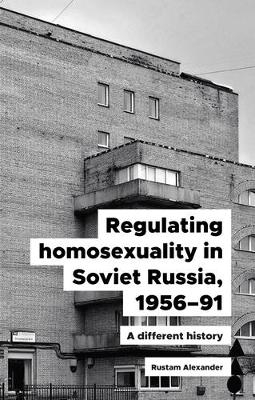
Regulating Homosexuality in Soviet Russia, 1956–91
A Different History
Seiten
2021
Manchester University Press (Verlag)
978-1-5261-5576-4 (ISBN)
Manchester University Press (Verlag)
978-1-5261-5576-4 (ISBN)
This book examines the way homosexuality snaked through expert discourse in Soviet courts, prisons, science and education, helping us understand the history of sexuality in Russia and the USSR. -- .
This ground-breaking book challenges the widespread view that sex and homosexuality were unmentionable in the USSR. The Khrushchev and Brezhnev eras (1956–82) have remained obscure and unexplored from this perspective. Drawing on previously undiscovered sources, Alexander fills in this critical gap.
The book reveals that from 1956 to 1991, doctors, educators, jurists and police officers discussed homosexuality. At the heart of discussions were questions which directly affected the lives of homosexual people in the USSR. Was homosexuality a crime, disease or a normal variant of human sexuality? Should lesbianism be criminalised? Could sex education prevent homosexuality? What role did the GULAG and prisons play in homosexuality across the USSR? These discussions often had practical implications – doctors designed and offered medical treatments for homosexuality in hospitals, and procedures and medications were also used in prisons.
This book is relevant to United Nations Sustainable Development Goal 5, Gender equality. -- .
This ground-breaking book challenges the widespread view that sex and homosexuality were unmentionable in the USSR. The Khrushchev and Brezhnev eras (1956–82) have remained obscure and unexplored from this perspective. Drawing on previously undiscovered sources, Alexander fills in this critical gap.
The book reveals that from 1956 to 1991, doctors, educators, jurists and police officers discussed homosexuality. At the heart of discussions were questions which directly affected the lives of homosexual people in the USSR. Was homosexuality a crime, disease or a normal variant of human sexuality? Should lesbianism be criminalised? Could sex education prevent homosexuality? What role did the GULAG and prisons play in homosexuality across the USSR? These discussions often had practical implications – doctors designed and offered medical treatments for homosexuality in hospitals, and procedures and medications were also used in prisons.
This book is relevant to United Nations Sustainable Development Goal 5, Gender equality. -- .
Rustam Alexander is an independent scholar who holds a PhD from the University of Melbourne -- .
Introduction
1 Homosexuality in the Soviet GULAG (1956–59)
2 Same-sex desire and sex education under Khrushchev (1956–64)
3 From sodomy to homosexuality: same-sex desire and the rise of Soviet sexopathology in the 1960s
4 Soviet legal and criminological debates on the decriminalisation of homosexuality (1959–75)
5 Between disease and crime: sexopathology and prison homosexuality (1970–80)
Conclusion -- .
| Erscheinungsdatum | 26.05.2021 |
|---|---|
| Zusatzinfo | 17 black & white illustrations |
| Verlagsort | Manchester |
| Sprache | englisch |
| Maße | 138 x 216 mm |
| Gewicht | 449 g |
| Themenwelt | Geschichte ► Allgemeine Geschichte ► Zeitgeschichte |
| Geschichte ► Teilgebiete der Geschichte ► Kulturgeschichte | |
| Geschichte ► Teilgebiete der Geschichte ► Militärgeschichte | |
| Recht / Steuern ► Rechtsgeschichte | |
| ISBN-10 | 1-5261-5576-1 / 1526155761 |
| ISBN-13 | 978-1-5261-5576-4 / 9781526155764 |
| Zustand | Neuware |
| Haben Sie eine Frage zum Produkt? |
Mehr entdecken
aus dem Bereich
aus dem Bereich
Gewalt, Umwelt, Identität, Methode
Buch | Softcover (2024)
Spector Books OHG (Verlag)
36,00 €
wie Freud im Kollektiv verschwand
Buch | Hardcover (2024)
Klett-Cotta (Verlag)
25,00 €


